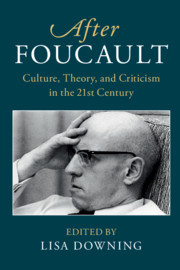Book contents
1 - Foucault's Genealogy
from PART I - GOING AFTER FOUCAULT
Published online by Cambridge University Press: 30 May 2018
Summary
Introduction
Genealogy is, without a doubt, one of the key concepts in Foucault. As such, it has been extensively discussed in the secondary literature. The aim here is not to repeat these accounts. Rather, it is to approach the topic specifically from the perspective of a queer philologist. That is because, in the opinion of the author, Foucault's genealogy can be closely related to queer theory and practice. And because Foucault, like Nietzsche before him, is programmatically concerned with the questionable relationship between words and things, Les mots et les choses.
Now genealogy, of course, has been with us at least since Adam and Eve. Long before Americans began poring over parish registers looking for their ancestors, important people had relied on family trees as the justification for their place in society. Why else, after all, would the Holy Book of the Christians include such seemingly endless litanies of ‘begats’? That the word is ‘begat’, though, and not ‘brought forth’ points to a serious flaw in the system; for in the days before DNA testing there was no way of knowing for sure who did actually do the begetting. Hence it becomes necessary to take the written word for it: the appearance of certain names in chronicles like the Bible was the only thing that stood between legitimacy and bastardy, with all that implied. And precisely because so much is at stake, it becomes impossible not to mistrust the written sources on this point. From the very beginning then, genealogy, the documentary basis for structures of power, is tendentious and unreliable.
It is also, of course, constitutively heteropatriarchal and profoundly misogynist. In this system, everything depends on couplings between people of different sexes, in which the only significant participant is the man. Accordingly, the place allotted to women in the Book of Chronicles is exiguous. And while we do not know (and should not care) what Seth and Co. did with their seed in their spare time, the obligation on them to be seen to have sons makes of these lists a stick and a carrot for the sexually less successful. For these others – the impotent, the barren, and those married to them, the onanist, the sodomite, and the unwed – society reserved some of its severest strictures.
- Type
- Chapter
- Information
- After FoucaultCulture, Theory, and Criticism in the 21st Century, pp. 17 - 30Publisher: Cambridge University PressPrint publication year: 2018
- 2
- Cited by



